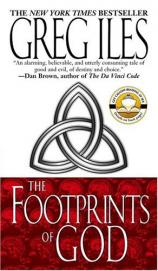The Footprints of God
Review
The Footprints of God
The late Philip K. Dick spent the greater balance of his literary
career dealing with questions of perception and reality, leading to
a penultimate trilogy --- VALIS, THE DIVINE INVASION and THE
TRANSMIGRATION OF TIMOTHY ARCHER --- which dealt with the concept
of God and divine intervention in affairs of humanity.
Greg Iles in THE FOOTPRINTS OF GOD undertakes issues evocative of,
though certainly not imitative of, Dick's work, combining the
divine with elements of quantum physics and the ever-evolving world
of computers. While other authors have explored this territory ---
Arthur C. Clarke comes most immediately to mind with both the 2001
books and his award-winning short story "The Nine Billion Names of
God" --- THE FOOTPRINTS OF GOD has an immediacy to it that adds
tension to the mix. The events taking place here could be happening
now, at least with respect to Artificial Intelligence, or
"A.I."
I've been of the opinion that laptop and desktop computers have a
rough A.I. that leads to the performance of what we humans would
call a practical joke. I'm referring to the things that computers
occasionally do that cause the SYSOP guys to shrug and roll their
eyes when asked for a cause of the irritating effect that has
manifested itself in the middle of some task. What is discussed
here, however, involves a bit more than that.
THE FOOTPRINTS OF GOD concerns Project Trinity, an attempt to
construct a computer that will surpass the power of the human mind.
Rather than trying to replicate the human brain, Project Trinity is
attempting through an advanced MRI procedure to upload a "map" of
the brain, with images, memories and thought processes, into the
computer itself. Each member of the Project Trinity team has
undergone this procedure and has experienced unique side effects.
Dr. David Tennant is attached to the team as an ethicist, with his
presence tolerated --- or not --- to varying degrees by the others
on the team. Tennant, since undergoing the MRI scan, has
experienced somnambulism, with dreams and visions that include the
memories of the experiences of Jesus.
When a friend and fellow scientist on the project dies suddenly and
unexpectedly, Tennant quickly realizes that he was murdered and
that the individual responsible for the murder is the head of
Project Trinity. Tennant turns to Dr. Rachel Weiss, the
psychiatrist who has been treating him for the nightmares and
visions that he reports. Weiss at first believes that the
nightmares and Tennant's interpretations of them are an extreme
result of a prolonged grief reaction to the deaths years ago of
Tennant's wife and daughter. When an assassin attempts to kill
Tennant and Weiss, they are forced to leave Project Trinity in a
chase that winds across the country and around the world. By the
time they uncover the truth behind Project Trinity, however, the
computer is operational, indestructible and holding all of humanity
hostage.
Iles has acquired a well-deserved reputation for writing
intelligent, suspenseful thrillers, and he has outdone himself once
again with THE FOOTPRINTS OF GOD. Iles's introduction of quantum
physics and the concepts of God and creation into THE FOOTPRINTS OF
GOD is perfect. He throws in just enough to whet the reader's
appetite, explains the concept simply enough to avoid any
confusion, and jumps back into the story. A lesser writer would
have bogged down the narrative with the hows, whys and wherefores
that at this point are all unknowns anyway. Iles's suspenseful
ending is just about perfect as well, combining a satisfactory
resolution with just a hint of the unknown.
THE FOOTPRINTS OF GOD is ultimately more than just a novel of
speculation; it may be a roadmap to what is just around the
corner.
Reviewed by Joe Hartlaub on January 22, 2011











